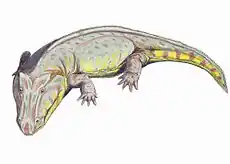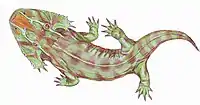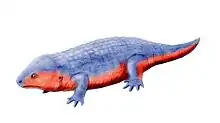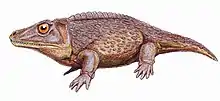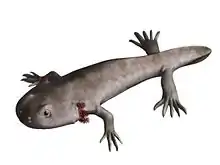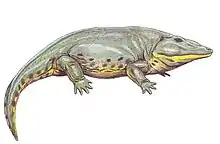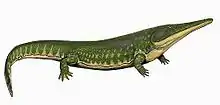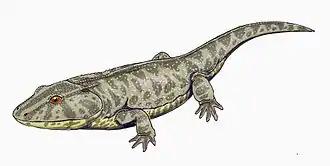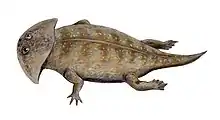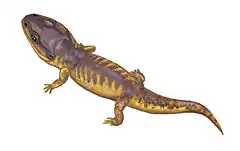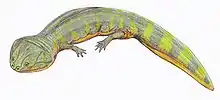Rhinesuchus
Rhinesuchus is a large temnospondyl amphibian. Remains of the genus are known from the Permian of the South African Karoo Basin's Tapinocephalus and Cistecephalus assemblage zones, both belonging to the Beaufort Group. The skull of Rhinesuchus had a flat triangular shape with blunt snout similar to some of the other large amphibians, and had a palate filled with small sharp teeth, suggesting that it hunted fish. Also, the small eyes were on top of the head suggesting that it approached its prey from below. It is a popular misconception that Rhinesuchus is named after the Rhine River in Europe; Rhinesuchus actually gets its name from the Greek word for nose. The type species is Rhinesuchus whaitsi. Two more species, R. africanus and R. wadiai, are considered to be nomen dubium. R. broomianus and R. beaufortensis have been synonymized with R. whaitsi, while R. capensis has been moved out of the genus into Rhinesuchoides. Muchocephalus has also been synonymized with R. whaitsi.[1] The first rhinesuchid from outside southern Africa was described as Rhinesuchus wolgodvinensis (Yacovlev, 1916). The specimen, collected from Early Triassic beds from Russia, was considered the first Rhinesuchus from the Triassic, although currently it is considered, instead, a wetlugasaurid. [2]
| Rhinesuchus | |
|---|---|
 | |
| Rhinesuchus skull in situ | |
| Scientific classification | |
| Kingdom: | Animalia |
| Phylum: | Chordata |
| Order: | †Temnospondyli |
| Suborder: | †Stereospondyli |
| Family: | †Rhinesuchidae |
| Genus: | †Rhinesuchus Broom, 1908 |
| Type species | |
| †Rhinesuchus whaitsi Broom, 1908 | |
| Synonyms | |
| |

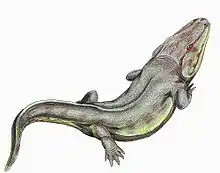
References
- Mariscano, C.A.; Latimer, E.; Rubidge, B.; Smith, R.M.H. (2017). "The Rhinesuchidae and early history of the Stereospondyli (Amphibia: Temnospondyli) at the end of the Palaeozoic". Zoological Journal of the Linnean Society. doi:10.1093/zoolinnean/zlw032.
- Marsicano, Claudia & Latimer, Elizabeth & Rubidge, Bruce & Smith, Roger. (2017). The Rhinesuchidae and early history of the Stereospondyli (Amphibia: Temnospondyli) at the end of the Palaeozoic. Zoological Journal of the Linnean Society. 181. 10.1093/zoolinnean/zlw032.
- S. H. Haughton. 1925. Investigations in South African fossil reptiles and amphibians (Part 13). Annals of the South African Museum 22:227-261
- R. Schoch and A. R. Milner. 2000. Stereospondyli. Handbuch der Paläoherpetologie - Encyclopedia of Paleoherpetology 3B:1-203
- R. J. Damiani and B. S. Rubidge. 2003. A review of the South African temnospondyl amphibian record. Palaeontologia africana 39:21-36
